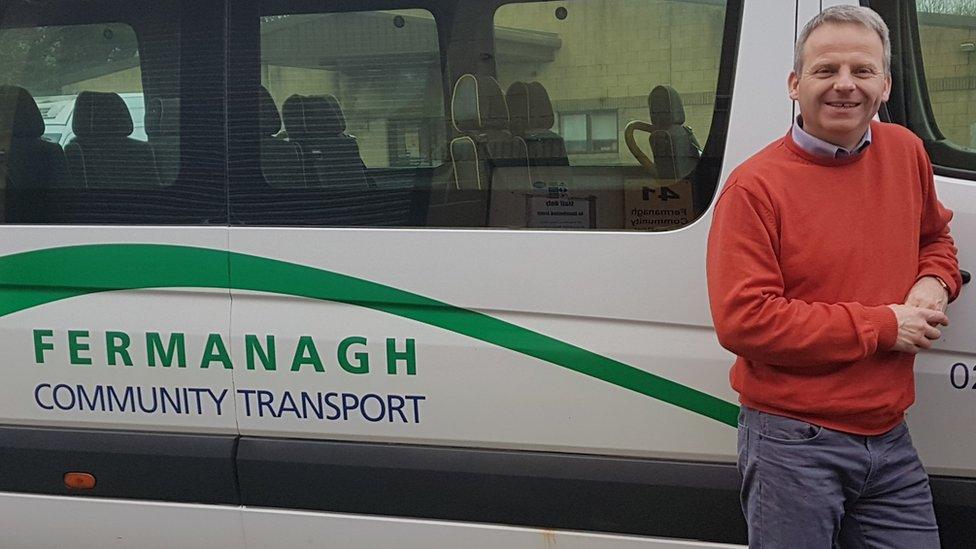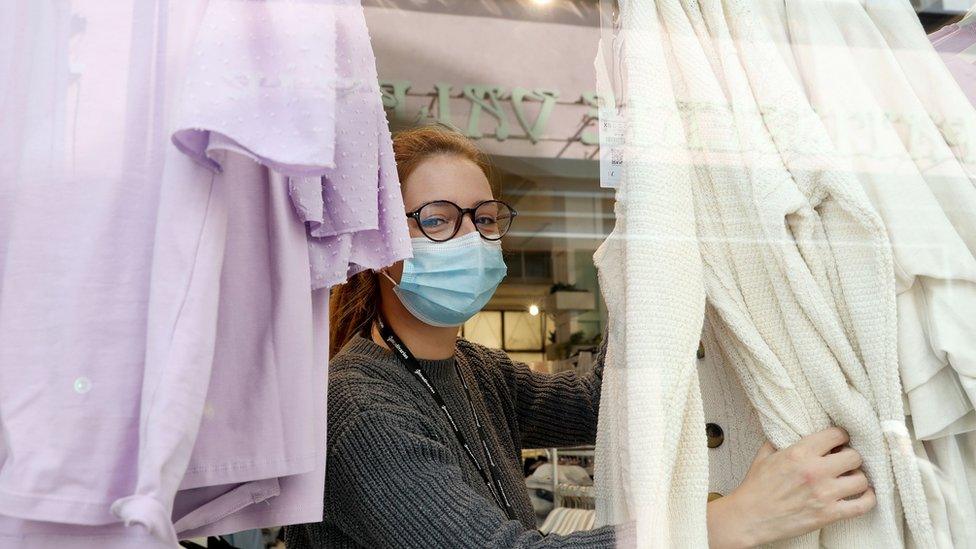Coronavirus: Will the pandemic change our commuting habits?
- Published

John McBride, Stevie Morrow and Bernie Cheshire talk about their commuting challenges and changes
Many people who worked from home during the coronavirus pandemic are considering how they will travel to their workplace as businesses begin to reopen.
So will our commuting habits change?
Previously, we thought very little of sitting in traffic, waiting on a train or getting on an early-morning flight.
However, with the surge in working from home, do people want to return to planes, trains and automobiles?
We spoke to 'super-commuters', cross-border workers, those in rural areas and people who walk or cycle to work to gauge their feelings as society continues its attempt to return to normal.

'I flew to the moon and back'
Stevie Morrow commuted 500,000 miles around the world in the 10 years before lockdown.
He tracked each mile on a mobile app as he flew between Belfast, London, New York and Europe.
"The miles I commuted were like flying to the moon and back," he said.
"But those miles have disappeared since lockdown."

Stevie Morrow, who travelled half-a-million commuting miles before lockdown, said cutting his commute has been "transformational"
The average commuter in Northern Ireland travelled 2,901 miles over 310 journeys between 2016 and 2018, according to NISRA, external (the Northern Ireland Statistics and Research Agency).
Its figures also show that about 46% of passengers from Belfast City Airport and 40% of Belfast International Airport passengers travelled for business between April 2018 and March 2019.
Mr Morrow, from Moira, County Down, has clocked up many more miles than the average commuter but said he hasn't even "set foot in Belfast" since March, when he began working from home.
The cut in travelling has been "transformational", he said.
'Super-commuting'
"Within two weeks I felt much healthier, I was sleeping better and not having a sore neck from cramped planes.
"I gain an extra two hours per day from the commute to Belfast alone, that gives me time to help with homework and do more cooking."
Mr Morrow, chief operations officer of fintech company Options, does not expect to fly again this year and believes lockdown may change future attitudes to so-called "super-commuting".
"We viewed travel as an essential part of our business, the cost was significant.
"Being face-to-face with staff and clients will always be important but it is hard to imagine a return to the same level of travel.
"We will look at travel in a very different way, I'm not sure we will still talk about 'popping' over to London.
"Even though we are a technology company, it really took something like a pandemic for us to embrace certain tech - video calls have become a massive part of our day."

The cross-border commuters
John McBride, 50, spent five hours per day travelling to and from his home in County Donegal to work in Belfast before the pandemic.
His cross-border commute included driving to a park-and-ride facility, a two-hour bus journey and a walk.
Mr McBride, who works for a leading child health organisation, has been working from home since mid-March.
There are obstacles to be overcome before he will consider boarding a bus to work again.
"Commuting is already stressful, the additional stress of commuting when there is a virus around is a double concern," he said.

John McBride said he has many questions before he would be happy to commute by bus
"I have family who are shielding and I want to do my bit to protect them.
"I am not confident I would walk away without the virus having an impact."
Mr McBride said there should be a public transport consultation for regular commuters.
"Before I can be comfortable on a bus again I need to know all measures are in place to assure me the risk is well managed.
"How often will the bus be cleaned down, will there be sanitisers, will I need to wear a mask? What happens if somebody gets on the bus sneezing or coughing?"
A Translink spokesperson said a range of measures had been introduced in line with the Public Health Agency and NI Executive guidance to safeguard staff and passengers, 80 to 90% of whom are commuters.
These measures include contactless payments, the recommended use of face coverings while on board and advice to wash hands and maintain social distancing, external.
But Mr McBride said he believes commuting in the future will only be necessary "when you need to meet people in person".
"Technology is working," he added.

'It feels strange being on the bus my own'
For some, working from home during the pandemic has not been an option.
Supermarket worker Bernie Cheshire, 62, from a rural community outside Enniskillen, County Fermanagh, has continued her usual commute with a local community transport service throughout.
She now travels alone on the minibus for health and safety reasons.
"It feels strange being on my own but it is clean and I am well looked after," she said.
"If I need to wear a mask on the bus in the future, I will do it."

Bernie Cheshire says it feels strange to commute to work alone on community transport
Bernie is one of 20-25 people currently transported individually to and from work by Fermanagh Community Transport, according to its manager Jason Donaghy.
He reported an increased demand for the service from shop workers, hospital staff, carers and banks and building society staff.
Mr Donaghy said the requests from workers "scattered across the county" have increased as shops reopen, with Fermanagh's dispersed rural population facing particular challenges.
"People have been offered jobs but then say they can't get to work because of transport difficulties," he said.

Jason Donaghy said there is a growing demand for community transport as shops reopen
"Many of our workers are on a minimum wage so running a car is not an option and buses may not go near their homes.
"We are being ultra-cautious by only taking one person at a time, but we hope we might be able to facilitate three people on the bus moving forward."

'I have ruled out public transport'
Those who walk or cycle to work may face fewer commuting changes.
Michael Breslin walks three miles per day from home to his family's printing and design business in Londonderry.

He occasionally took a taxi before the pandemic but said he would not consider that now.
"I didn't use much public transport before but I have ruled it out now because of the virus. I just get up earlier so I have time to walk," he said.
- Published8 January 2021
